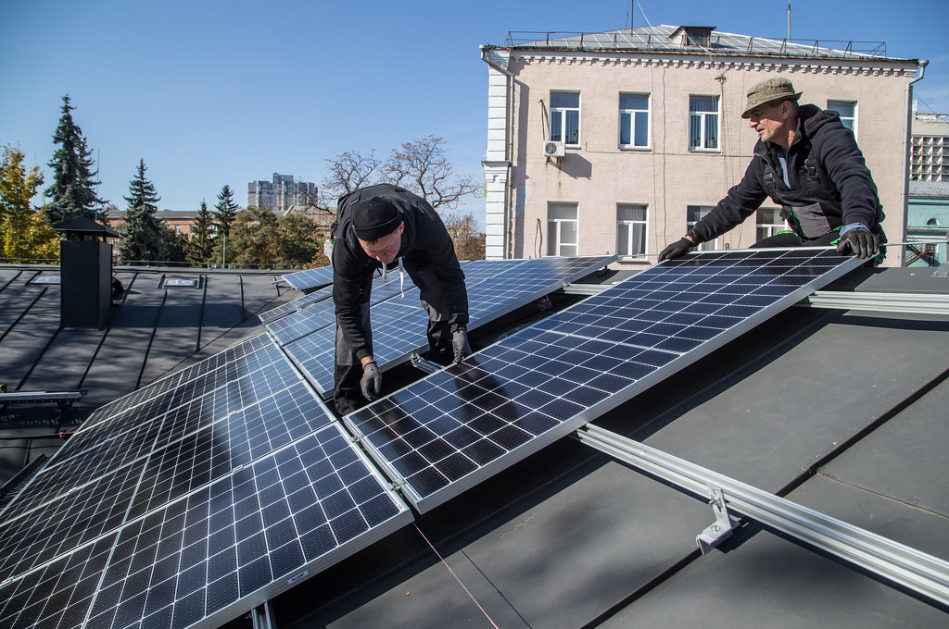Energy security as the foundation for Ukraine’s formula for peace
A vision for the long-term reconstruction of the Ukrainian energy system and securing global energy security
German Galushchenko is the Minister of Energy of Ukraine. This essay is part of the Global Energy Agenda.
The enduring struggle of the Ukrainian people for their independence, sovereignty, and their very existence is approaching the seven-hundred-day mark. Despite the heavy losses, destruction, and constant shelling, Ukraine continues to be a symbol of defiance, an example of true freedom and courage, an important actor in the international arena, a reliable partner for its allies, and a major focus of attention among geopolitical experts and media circles.
Not only is Ukraine defending its right to exist, it is also making a significant contribution to the international agenda by setting a number of precedents for the world: in military capabilities, through its long-term defense and the heroic deeds of its armed forces that have shattered the myth that Russia has the world’s “second best military”; in the economic sphere, through its resilience and high level of adaptability and growth capacity; in the energy sector, by counteracting the physical threats to nuclear reactors, surviving blackouts, and destroying the Russian monopoly in the production of special types of nuclear fuel; and in the geopolitical sector, in the form of unity of the democratic world in the fight against a common aggressor that is trying to influence the world order and domestic policies of other countries through terror, blackmail, bribery, and disinformation.
Unfortunately, this war has also created negative precedents, such as the first attack in history on peaceful nuclear facilities, including the occupation of a nuclear power plant of an International Atomic Energy Agency member state by another member state; provoking a massive human-caused disaster in Europe with the destruction of the Kakhovka hydroelectric power plant; and Russia’s use of Ukrainian energy facilities and infrastructure as instruments for causing humanitarian damage, as targets for missiles and drones, as storage for weapons and explosives, and as a station for military personnel and equipment. Of the many international precedents set by the war, Russia’s malicious leveraging of energy and nuclear security has raised the alarm on just how powerful a weapon energy can be.

The fight of Ukraine and its allies has thus expanded from a battle for territory and independence to a stand against the dictatorship of fossil fuels the world over.
Russia’s war against Ukraine has triggered historic shifts in the energy sector, leading to volatile energy prices, supply shocks, security concerns, and economic uncertainty. The import of Russian fossil fuels has become politically toxic for most of its consumers, leading to the democratic world’s sudden need to search for new supply chains and other ways to meet its energy needs. One of the first measures countries took to pivot away from Russian energy supplies was to accelerate the pace of the energy transition to low-carbon or carbon-free sources and technologies, making decarbonization a focal point of the geopolitical debate. The fight of Ukraine and its allies has thus expanded from a battle for territory and independence to a stand against the dictatorship of fossil fuels the world over. That is why the main task that Ukraine is working on today with its international partners is to jointly develop a model of global energy resilience that will prevent any future cases of violation of energy and nuclear security and the use of energy as a geopolitical instrument of influence or a military tool of war. This task is a crucial element of the peace formula—a plan for the war’s end—that was presented by Ukrainian President Volodymyr Zelenskyy first at the Group of Twenty summit in November 2022, and then later at the United Nations General Assembly in September.
Among the ten points of the formula for restoring peace, two are dedicated to energy, highlighting its critical importance to the process. They address the need to guarantee energy security and radiation and nuclear safety, as their absence has multiple destabilizing effects. Without these safeguards, the risk of global food and climate insecurity will become even greater, Russia’s ability to exert pressure on political and geopolitical decision-making and to manipulate public opinion through nuclear blackmail will grow, as will its propensity to commit crimes against humanity and the environment with impunity.
However, amid the terrible events taking place in Ukraine, we must seize upon the promise of the future. Ukraine now has the opportunity to completely rebuild its energy system and the country as a whole, to elevate energy and nuclear safety to a new level, and to initiate the process of strengthening international security guarantees. I am confident that Ukraine’s experience with rebuilding based on the principles of the peace formula will become a valuable asset for European and global energy policy. The peace formula proposed by Ukraine is essential not only for ending the war and guaranteeing peace in Ukraine, but also for a universal set of measures to end other wars and armed conflicts on the planet and overcome global problems. That is why the formula is based on international cooperation and coordination of efforts, in particular, to develop mechanisms for responding to cases of energy coercion and blackmail. Countries that uphold the principles of democracy must agree on these mechanisms and requirements for excluding from international processes an aggressor state that violates international law and the values of sustainable development and climate security. Accountability for aggression against energy and climate security should also become a functioning part of international law in the form of appropriate reparations, for example, for greenhouse gas emissions generated by armed hostilities.
Rebuilding Ukraine’s energy sector in line with the world’s best practices in sustainable development and decarbonization will help to finally break the grip of the fossil fuel dictatorship and strengthen the new energy model of the world. An important step toward this will be, in particular, Ukraine’s accession to the European Union’s (EU’s) energy regions as a kind of rapid response to energy crises and shortages across Europe, the development of a network of interconnectors for efficient cross-border electricity exchange, and Ukraine’s access to regional gas security clusters in Central and Southeast Europe. Attacks on and occupation of energy infrastructure, which are increasingly becoming the norm in modern warfare, should serve as an incentive to develop new international approaches and standards to ensure the physical security of such facilities, develop international logistics infrastructure and routes for the rapid supply of necessary equipment and spare parts, develop storage networks in safe regions, and strengthen the international legal framework for preventing nuclear threats.
The peace formula proposed by Ukraine is essential not only for ending the war and guaranteeing peace in Ukraine, but also for a universal set of measures to end other wars and armed conflicts on the planet and overcome global problems.
Today, Ukraine is still Europe’s largest country with a great potential for innovative and technological recovery, also becoming a major supplier of renewable energy and critical and rare earth materials. Our goal is for Ukraine to become an energy hub in Europe, which is already being borne out: our foreign partners are utilizing Ukrainian underground natural gas storage facilities; Ukraine continues to export electricity to the EU even amid the war; and in recognition of Ukraine as one of the key partners in the development of the hydrogen industry, the EU included our country among the signatories to the Roadmaps to New Nuclear conference communiqué.
In the long run, Ukraine is eager to become a net exporter of affordable and clean energy, as well as a substantial contributor to energy security in the world. We can be confident in this outcome, as Ukraine has one of the largest available platforms for the development of innovative infrastructure and projects, including industrial parks, green technologies, renewable energy, hydrogen, and small modular reactor technology.
Ukraine’s experience in ensuring the functioning of the energy system during the war, as well as the precedents it has set, including the first-ever comprehensive peace formula, have already paved the way for a new model of global energy sustainability based on energy and nuclear security principles, which will facilitate a joint transition to a clean, decarbonized, and, most importantly, peaceful future.
All essays
Related program

The Global Energy Center develops and promotes pragmatic and nonpartisan policy solutions designed to advance global energy security, enhance economic opportunity, and accelerate pathways to net-zero emissions.
Image: UNDP office in Ukraine installs solar panels (Credit: UNDP Ukraine)
